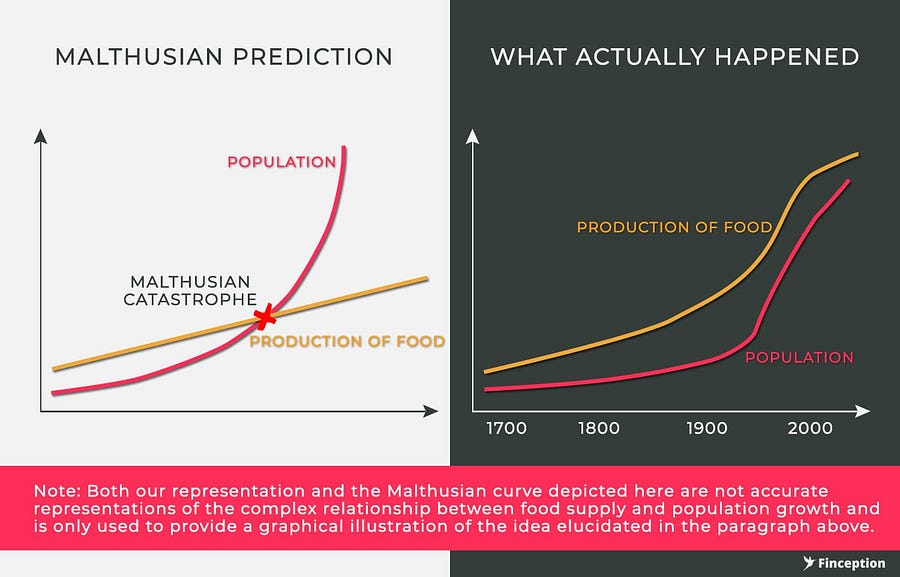How are businesses adapting to the Coronavirus Pandemic?

In today's newsletter we talk about human spirit, ingenuity and businesses trying to adapt in a new world dominated by a contagious virus.
But before that, a trip down memory lane...
The Malthusian Prophecy
When Robert Malthus propounded one of the most controversial ideas of the 18th century there was considerable fear about humanity’s ability to survive in the face of rising population. His principal contention was that while food production would grow linearly, population growth would be exponential. This, he believed would lead us to a point where the world population would far outstrip food production rates and create a widespread scarcity of grain and foodstuff.
Malthus was of the opinion that such a crisis could be averted only if natural forces intervened to fix the imbalance between food supply and population growth through natural disasters such as floods and earthquakes. Luckily for us, Malthus turned out to be wrong. As history would have it, people did not die of starvation, instead, the industrial revolution paved the way for farm mechanisation which in turn drastically improved farm productivity. And so we never actually ran out of food although it seemed as if it was a real possibility.

This, fellow reader, is a testament to the human spirit. No matter how bleak the situation, we always find ways to innovate and trudge along and right now, with coronavirus pushing humanity to the brink, we are seeing people adapt right in front of our eyes.
Consider for instance Work from home (WFH). Most Indian employers have been averse to the idea of working from home for a good while now. However, the need to contain the spread of the virus has made “WFH” an overnight necessity. And companies are doing everything they can to make the transition as smooth as possible- like replacing desktops with laptops, equipping employees with broadband connections and even having virtual coffee breaks to ward off loneliness. Team management tools like Zoom, Microsoft Teams, Slack and Google Hangouts have surged in popularity.
Now granted, some managers still worry that working from home lowers productivity, but a 2015 study conducted by Stanford gives evidence to the contrary. The study found that fewer breaks and comfortable home environments boosted productivity by 13% for call-centre employees at a Chinese travel agency Ctrip. Yeah, it’s only 1 study. Yeah, we don’t know the long term effects on organizational culture, yeah it’s still early days to say anything for certain, but it still gives us hope.
And it’s not just with tech employees. We are seeing empathy pour out across the board. Gig workers and hourly employees like drivers, delivery executives, construction workers, and cleaning staff have traditionally been at the bottom rung when it comes to benefits and job security. However, this public health crisis has forced organizations to address the well-being of workers across its ranks.
Companies like Amazon, Apple, Google, Facebook, and Uber have all announced some sort of compensation for part-time employees for the time they have to spend away from work due to illness or quarantine.
Take for instance — Uber. This is a company that has consistently argued that its contract drivers should not be eligible for the same benefits as regular employees. But now, they are offering these drivers sick pay. As the company succinctly put it- “We believe this is the right thing to do.” It may have to do with the fact that nobody wants to be the company that doesn’t support its workers right now. But again, they are trying to do right by these people and that counts for something.
And it’s not just the corporate world that has turned upside down. We are seeing a shift in the education industry as well. The OECD estimates that over 421 million children are now being affected due to school closures in 39 countries. And as schools and colleges are forced to shut down, most institutions have made the shift to online learning. The problem is, online educational initiatives haven’t yet seen wide-scale adoption. But, according to Michael Trucano, a World Bank specialist on education and technology policy, a ‘tipping point’ is exactly what was needed to push EdTech into the mainstream.
In fact, in 2014, he actually suggested that epidemics could be these tipping points. He argued that China was forced to boost distance education during the SARS outbreak, leading to innovative, transformational uses of online tools. And COVID-19, too, has pushed educational institutions worldwide to implement creative solutions.
For example, students in Hong Kong have started learning at home via interactive apps. In China, 120 million children now have access to learning material through live television broadcasts. One school in Lebanon is leveraging online learning even for subjects like Physical Education. As homework, students were asked to shoot and send over videos of themselves engaged in athletic training- and they picked up unexpected skills along the way. As one parent said, “while the sports exercise took a few minutes, my son spent three hours shooting, editing and sending the video in the right format to his teacher.”
So here’s the bottom line. The outlook is grim. The future — uncertain. But don’t count us out yet. As Ronald Reagan once said — “There are no constraints on the human mind, no walls around the human spirit, no barriers to our progress except those we ourselves erect”
Time to break the barriers, ladies and gentlemen.
Until then…
